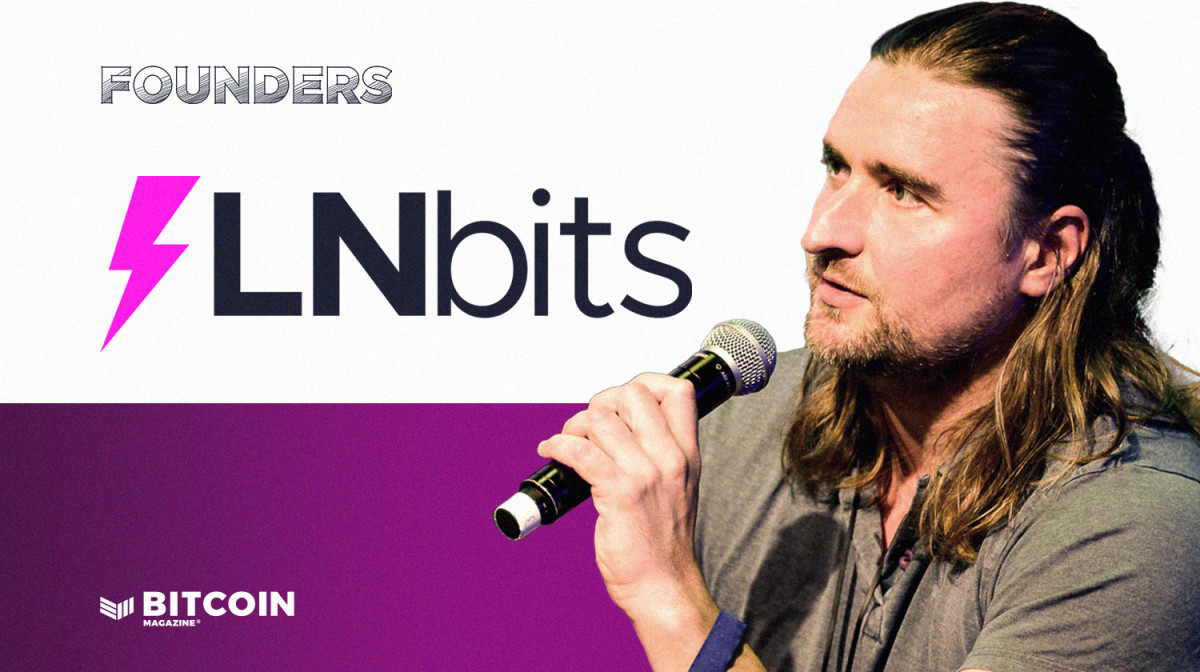business
Building LNbits — the WordPress for Your Bitcoin Lightning Node — With Ben Arc
Published
2 months agoon
By
admin

Company Name: LNbits
Founders: Ben Arc
Date Founded: Project: 2019 | Company: 2022
Location of Headquarters: Fully remote (most developers based in Europe)
Amount of Bitcoin Held in Treasury: N/A
Number of Employees: 6 (+ “a couple dozen other developers”)
Website: https://lnbits.com/
Public or Private? Private
Five years ago, Ben Arc first had the vision for LNbits — free and open-source software that works with any Lightning Network funding source and offers a suite of extensions for both personal and business use cases.
The vision for the project came to him in what he describes as a flash of inspiration.
“Christian Russo, the developer of the RaspiBlitz, had come down to visit and I remember sitting in a little wash cottage where he was staying, and I just sat on the sofa and I kept going, ‘LNbits, LNbits, LNbits,’” Arc told Bitcoin Magazine. “And then I was like, ‘I think I’m going to make this project where it can be set on top of any funding source and you’ll get this common API and then have some wallets and stuff.’”
Soon after, Arc, a Bitcoiner based in Wales, began working on the first LNbits project, a point of sale (PoS) extension for his friend Jörg Platzer, owner of the now defunct Berlin-based Bitcoin bar Room 77.
“We managed to get the PoS in the bar, and Jörg was amazed how well it worked,” recounted Arc.
“What he really wanted was like an accountancy layer from which you could export CSV and then import it into different wallets, so you could have different PoSs and they’d have different wallets. None of that stuff was possible in the node implementations at the time,” he added.
“So, we needed to build that for Jörg, and then I needed to build something so I didn’t have to keep replicating work when it came to creating different versions of projects.”
That something was LNbits.
The LNbits Developer Team Forms
In the years that followed, some of the brightest developers in the Bitcoin and Lightning space gravitated to LNbits, making contributions that would help put the project on the map.
These developers included Calle, creator of Cashu; fiatjaf, creator of Nostr; Pavol Rusnak, co-founder of Satoshi Labs and a host of other notable names and pseudonyms including but not limited to dni, Eneko, Vlad Stan, supertestnet and Black Coffee. (Arc also shared that the initial design for Nostr “partly came out of LNbits” and that Cashu “was an LNbits project for such a long time.”)
This makes the LNbits developer team the Wu-Tang Clan of Bitcoin and Lightning developers — an über-talented supergroup whose members do groundbreaking work both together and on their own.
And if the LNbits developer team is Wu-Tang, then Arc is the RZA, the head of the group who organizes things and helps set up business deals. That said, the LNbits team came together less because of a master plan by Arc and more out of practicality.
“LNbits came out of necessity because a lot of us were replicating work,” said Arc.
“A lot of us were having to make all these different versions of our projects for all these different node implementations,” he added, making the point that the primary motivation behind LNbits was to reduce redundancy.
The team really came together when Arc learned that major entities in the space were beginning to use the software. At an Adopting Bitcoin conference in El Salvador, Arc bumped into some of the members of the team from IBEX, who mentioned that they were using LNbits.
“They said, ‘We love our LNbits. We’re using it for our products in our bank,’” recalled Arc.
“And I was like, ‘Well, it was really buggy beta software. Please don’t use it in your bank,” he added with a laugh.
“At that point, everyone who was working on LNBits was like, ‘Okay, wow, people are using this thing. I think we now need to make a more stable version that people can use and access, particularly if they’re putting it in their software stacks.’”
Setting Up LNbits, The Company
Arc’s interaction with the IBEX team made him realize that the time had come to turn LNbits into a proper business.
“We had to set up a company, which could then pay developers to work on LNbits,” said Arc.
Arc paralleled the relationship between LNbits the open-source software and LNbits the company to WordPress.org and WordPress.com. WordPress.org is the company that manages and develops WordPress.com, which is open-source software.
LNbits and WordPress are also similar in that anyone can develop extensions that give WordPress-powered websites extra functionality just as anyone can develop extensions for LNbits.
While it’s easy to incentivize development in LNbits’ extension marketplace by allowing developers to charge for the extension they create, getting developers to work on the software itself is more difficult. Hence, Arc set up the company.
“By setting up the company, we have some funds to put into the development work, which isn’t so glamorous, isn’t so fun,” said Arc of how LNbits approaches its software development.
“You’re less likely to kind of get people doing that on a free and open source project.”
Funding LNbits
Arc initially had some trepidation about telling the LNbits developer team that he was going to be setting up the business, though he was pleasantly surprised by their reaction when he shared the news.
“I was very nervous with our free and open source community to break the news to them that we were going to set up a business to help fund development and stuff,” said Arc. “But when we told them, they were all super excited about it.”
LNbits has since raised approximately $1 million in investment from VCs, an amount and an arrangement with which Arc is comfortable.
“I really like private capital when it’s beholden to a free and open source project,” said Arc.
He went on to describe how LNbits would have had to have raised between $10 and $20 million if it had built LNbits as a proprietary piece of software. Building it organically has been far cheaper, and building with the Bitcoin community in mind all along has had benefits, as well.
“To have this piece of software and then also have this community, which you’re kind of beholden to, stops you from making bad decisions,” explained Arc.
Coming Out Of Beta
While LNbits has become more widely used over the last five years, it’s remained in beta all the while. Arc has been in no rush to officially release a product that he didn’t feel was stable enough.
“In Bitcoin, a lot of projects come out of beta too early,” explained Arc.
“It’s just kind of a sad and scary reality that they want people to trust the software which they’ve developed, but we didn’t want to do that. We really wanted to be very conservative,” he added.
In preparation to release version one, LNbits has incorporated some funding and swapping services.
“In the last release, we added PhoenixD as a funding source for LNbits,” began Arc, describing the server equivalent of the Phoenix Wallet for mobile.
“We added the Breez SDK. We’re using the Boltz swapping service for trustless Atomic Swaps in and out of Liquid. So, it means you can actually fund your LNbits with a Liquid Wallet, which absolutely blows my brain,” he added.
The Future of LNbits
Right now, Arc seems to simply be focused on getting version one live and then continuing to fine tune it so that people and businesses can rely on it in a professional capacity. Arc wants to be sure the team is focused so that it can “debug on the fly” if and when necessary.
Arc and the LNbits team also want to create more educational content around showing people how to use LNbits as well as how to create their own LNbits extensions.
“That was a success of the project early on,” said Arc. “We just did a lot of educational content and everyone was like, ‘Okay, cool, I can try and build something on this thing.”
While Arc also seems excited about how LNbits can further integrate with Nostr (he’s been toying around with running the Internet of Things (IoT) over Nostr), the most exciting part about the future for LNbits is its limitlessness.
Put another way, in just five years, it has attracted brilliant developers who’ve created the earliest iterations of their revolutionary technologies (e.g., Cashu, Nostr) via LNbits, and this isn’t to mention all of the innovative LNbits extensions developers have created.
The question now is who develops via LNbits in the next five years and what do they create?
While Arc doesn’t claim to know, he is surely excited about what comes next, especially in the wake of version one going live.
“Once we’re version one, that’s when the real fun begins,” said Arc.
“We’re starting to see glimpses of it, because we can just build fun extensions for functionality and build out product services,” he added.
“That really is when the fun begins for the project.”
Source link
You may like


Magic Eden Token Airdrop Date Set as Pre-Market Value Hits $562 Million


Blockchain Association urges Trump to prioritize crypto during first 100 days


Pi Network Coin Price Surges As Key Deadline Nears


How Viable Are BitVM Based Pegs?


UK Government to Draft a Regulatory Framework for Crypto, Stablecoins, Staking in Early 2025


Bitcoin Cash eyes 18% rally
business
MicroStrategy Boosts Convertible Notes Offering to $2.6 Billion to Buy Even More Bitcoin
Published
2 days agoon
November 20, 2024By
admin

MicroStrategy’s thirst for Bitcoin cannot be quenched, despite holding over $31 billion worth.
Barely two days after announcing a plan to sell $1.75 billion worth of convertible notes as a means to buy up more of the world’s top cryptocurrency, the firm said on Wednesday that it has expanded that offering to $2.6 billion worth of notes.
Michael Saylor, MicroStrategy’s co-founder and executive chairman, said the move was made due to “high demand” for the new notes over the last 48 hours.
Given high demand, we upsized our $MSTR offering of 0% convertible bonds due 2029 from $1.75 billion to $2.6 billion, including a $400 million greenshoe option, and priced it at a 55% conversion premium.
— Michael Saylor⚡️ (@saylor) November 20, 2024
As with those initially offered on Monday, the additional zero-interest senior notes announced today will mature in 2029 and are available only to qualified institutional buyers. They will be eventually redeemable for cash, MicroStrategy stock, or a mix of both.
That’s a mighty tempting offer for many Wall Street investors, given the recent, explosive growth of MicroStrategy’s stock. The company, which owns over 331,000 BTC—1.58% of the token’s total possible supply—has seen its stock balloon by over 870% in the last year, in the wake of Bitcoin’s surge. Earlier this month, the stock reached an all-time high.
If MicroStrategy manages to raise another $2.6 billion to buy up more Bitcoin, it would be able to purchase some 27,450 BTC at current prices.
While MicroStrategy once billed itself as a business intelligence and software company, the company’s bold Bitcoin wager has upended not just its value to shareholders, but also the way it now sees itself: as the “world’s first and largest Bitcoin treasury company.”
Edited by Andrew Hayward
Daily Debrief Newsletter
Start every day with the top news stories right now, plus original features, a podcast, videos and more.
Source link
business
Marathon Digital Issues $850M Convertible Note Sale to Repurchase Debt, Acquire Bitcoin
Published
3 days agoon
November 20, 2024By
admin

Bitcoin mining company Marathon Digital Holdings (MARA) is issuing $850 million in convertible notes, with the option to expand to $1 billion, as part of plans to repurchase existing debt, acquire Bitcoin, and fund corporate initiatives amid a recovering crypto market.
The Fort Lauderdale, Florida-based firm said Monday it plans to use $199 million of the expected $833 million in net proceeds from the sale to repurchase $212 million of its existing 2026 convertible notes, according to a statement.
The remainder will be allocated to acquiring additional Bitcoin and for general corporate purposes, including working capital, strategic acquisitions, expansion of assets, and repayment of other debt, the company said.
Convertible notes are a type of debt-based financial instrument that a company sells to raise capital. The notes are typically converted into equity shares at a later date, enabling investors to hold partial ownership of the company.
Marathon’s latest offering comes as several firms globally begin acquiring and holding Bitcoin on their balance sheet following a market rally that has catapulted the price of the world’s oldest crypto to more than $94,000.
The most prominent include MicroStrategy, holding up to $30 billion in Bitcoin, and Japan’s Metaplanet, which has scooped up more than 1,000 BTC this year, worth roughly $93 million to date.
Meanwhile, Semler Scientific (SMLR) acquired nearly $18 million in bitcoin earlier this month, the company said in a statement.
Starting December 1, 2027, holders of Marathon’s convertible notes can ask the company to repurchase them for cash, though terms may change if major events like mergers, acquisitions, or delisting occur.
The notes, which mature on March 1, 2030, can also be converted into cash, MARA stock, or a mix of both, the company said.
The Bitcoin miner’s stock traded at $19.86 on Tuesday, up 9% on the day, while its after-hours price remains little changed, Google Finance data shows.
Edited by Sebastian Sinclair
Daily Debrief Newsletter
Start every day with the top news stories right now, plus original features, a podcast, videos and more.
Source link
business
Bitcoin Multisig Company Casa Makes Self-Sovereignty Easy
Published
3 days agoon
November 19, 2024By
admin

Company Name: Casa
Founders: Nick Neuman, Jameson Lopp and others
Date Founded: Late 2017
Location of Headquarters: Remote
Website: https://casa.io/
Public or Private? Private
Being self-sovereign isn’t easy — especially if you aren’t technically-minded.
The team at Casa gets this and this is why, for over six years, the company has been helping customers secure their bitcoin in multisig wallets (also referred to as multi-key vaults).
The company was the first to offer an easy-to-use version of such a product that also came with customer support. It was Casa’s plan from the onset to be there for their customers, as this type of support was lacking in the broader crypto industry.
“The service element was what was missing from a lot of solutions out there,” Casa co-founder and CEO Nick Neuman told Bitcoin Magazine.
“People need help doing this stuff, especially for large amounts of money. It was always the plan to support customers, because it was impossible to get support from exchanges or hardware wallets,” he added.
“So, we just took a very support-heavy and user experience focused approach to everything.”
Casa’s approach has paid off, as the company has become a household name in the Bitcoin and crypto space, and has come a long way since Neuman first had the idea for a company like Casa seven years ago.
How Casa Started
It was toward the latter part of the 2017 bitcoin bull run when Neuman had grown tired of his previous work in finance and tech, and found himself down the proverbial Bitcoin (and crypto) rabbit hole. By February 2018, he had an idea for a company and entered himself into a hackathon to attempt to bring the idea to life.
“I participated in the first ETHDenver hackathon,” said Neuman.
“I went in with an idea that I called key split, which was basically taking a private key using Shamir secret sharing and creating a social recovery mechanism,” he added.
“I recruited a couple of people at the hackathon to build it with me, and we ended up winning.”
Neuman quit his job and set out to start a company around this technology he and his team had created. But word had gotten out about his victory at ETHDenver, and the previous CEO of Casa, who was the head of the company before it pivoted to offering multisig wallets, reached out to Neuman, asking him to come on board.
It was after learning that Casa had just recruited Jameson Lopp, self-described “professional cypherpunk” and now Chief Security Officer at Casa, that Neuman decided to join the team.
“I was like, ‘Well, Jameson’s going to be an unfair advantage,’” recalled Neuman with a chuckle. “Instead of starting my own company, I’m going to join.”
Soon after Neuman came on board, Casa retired its then flagship product, the Casa Node, and the company shifted its focus to user-friendly multi-key vaults, a much needed product at the time. Before Casa, multisig software was so complicated that even Neuman himself struggled to use it.
“There was the Armory multisig wallet and the Glacier protocol,” recounted Neuman.
“Glacier wasn’t even software. It was like a giant GitHub repo that you had to follow in order to set up your cold storage. Armory was super janky, too. I remember trying to use it once, and I couldn’t figure it out,” he added.
“We were the first to create multisig that was usable.”
How Casa Works
Casa offers users two main set ups. The first is a five-key vault, which includes three keys on three different hardware wallets, one on the user’s phone (which is backed up securely in the cloud) and one that Casa holds.
This was Casa’s first multisig product, which it rolled out while the company primarily focused on serving customers with a high net worth in bitcoin. Casa learned an important lesson while serving these clients, which was that even if developers create easy-to-use software, people still want an expert there supporting them as they use it — especially if they’re securing a lot of value.
“When you’re dealing with millions of dollars worth of Bitcoin, you really want to have an expert there who helps make sure that you don’t make a mistake,” said Neuman.
Casa’s other main product is for those who might not be sitting on bitcoin whale-type wealth, but who still hold enough bitcoin where a less-than-ideal security setup has the potential to keep them awake at night.
This product is Casa’s three-key vault, which the company brought to market in early 2019. It includes a key on a hardware wallet, a key on the user’s phone (which can be swapped out for another key on a second hardware wallet if the user prefers) and a key that Casa holds.
Casa began offering this setup because it “always wanted to be able to offer great security and usability to as many people as possible,” according to Neuman.
New Casa Services And Features
In the past year, Casa has further broadened the services it offers.
Two weeks ago, it announced its Enterprise Plan, which enables companies to more easily secure their bitcoin treasuries.
“We’ve had businesses using Casa for self-custody for years, but they were always using our retail plans and just making it work,” explained Neuman.
“We changed that, though, because I think corporate treasuries holding bitcoin has been popularized by MicroStrategy. We actually see that as a growing trend that’s worth taking advantage of, and we’re hearing from more Bitcoin companies that are storing bitcoin on their balance sheet that they need help with security,” he added.
This summer, Casa also began enabling users to replace hardware wallets used in their vaults with YubiKeys.
“We see people struggle with hardware wallets all the time, and so we were thought ‘How can we make this simpler?’” said Neuman. “We pieced together a couple of new pieces of technology that have passkey and and YubiKey key capabilities and were able to build something that hadn’t been done before.”
And in March, Casa launched Casa Inheritance, a service that makes it easier for the loved ones of Casa users to access the bitcoin secured in the vaults in the event of a user’s death.
“With Inheritance, we heard from our customers all the time ‘Okay, I feel good about my Casa setup, but I’m worried about what happens if I die,’” explained Neuman. “So, we built that feature to make it super easy for their family to recover the bitcoin in case the main account holder dies.”
Normalizing Multisig
Despite all of the work Casa has done in the last six years, some still have an emotional block when it comes to switching to a multisig setup. Whether it’s because this type of wallet format was more difficult to enable years ago or because it’s understandably anxiety-provoking to make changes to one’s bitcoin security, people seem to drag their feet when it comes to using a multisig setup — even if they really want to — according to Neuman.
“They hear the word ‘multisig’ and they’re like, ‘That’s too hard,’” explained Neuman. “What they don’t realize is that to get started with multisig with Casa, you can use your same hardware wallet, and it is literally the same amount of effort as using a hardware wallet, but you significantly improve your security by doing it.”
Neuman thinks that more people will come around and that multisig will become more widely adopted, especially during a bull market.
“It takes the price of bitcoin going up where people suddenly have more value to secure,” said Neuman. “And it takes people hearing from their friends ‘Yeah, I’m doing multisig and it’s not as hard as it sounds.”
For those that do get the urge to try Casa, the company is allowing people to try the service at no charge for a month.
Neuman feels that as more users come on board, it will not only benefit them, but potentially the industry at large as well.
“If we can make it out of this bull market without another massive blow up like FTX because we’ve helped more people self-custody in a way that they feel good about, that feels like a real win to me.”
Source link

Magic Eden Token Airdrop Date Set as Pre-Market Value Hits $562 Million

Blockchain Association urges Trump to prioritize crypto during first 100 days

Pi Network Coin Price Surges As Key Deadline Nears

How Viable Are BitVM Based Pegs?

UK Government to Draft a Regulatory Framework for Crypto, Stablecoins, Staking in Early 2025

Bitcoin Cash eyes 18% rally

Rare Shiba Inu Price Patterns Hint SHIB Could Double Soon

The Bitcoin Pi Cycle Top Indicator: How to Accurately Time Market Cycle Peaks
Bitcoin Breakout At $93,257 Barrier Fuels Bullish Optimism

Bitcoin Approaches $100K; Retail Investors Stay Steady

Solana Hits New ATH On Huge Whale Accumulation, More Gains Ahead?

Microsoft Should Buy $78 Billion Worth of Bitcoin

Ethereum Believers May Be Staring Down Opportunity As ETH Reaches Another Low Against Bitcoin: CryptoQuant CEO

UK government is ready for crypto regulations next year

“Crypto Dad” Chris Giancarlo Emerges Top For White House Crypto Czar Role
182267361726451435

Top Crypto News Headlines of The Week

Why Did Trump Change His Mind on Bitcoin?

New U.S. president must bring clarity to crypto regulation, analyst says

Ethereum, Solana touch key levels as Bitcoin spikes

Bitcoin Open-Source Development Takes The Stage In Nashville

Will XRP Price Defend $0.5 Support If SEC Decides to Appeal?

Bitcoin 20% Surge In 3 Weeks Teases Record-Breaking Potential

Ethereum Crash A Buying Opportunity? This Whale Thinks So

Shiba Inu Price Slips 4% as 3500% Burn Rate Surge Fails to Halt Correction

‘Hamster Kombat’ Airdrop Delayed as Pre-Market Trading for Telegram Game Expands

Washington financial watchdog warns of scam involving fake crypto ‘professors’

Citigroup Executive Steps Down To Explore Crypto
Mostbet Güvenilir Mi – Casino Bonus 2024

Bitcoin flashes indicator that often precedes higher prices: CryptoQuant
Trending

 2 months ago
2 months ago182267361726451435

 24/7 Cryptocurrency News3 months ago
24/7 Cryptocurrency News3 months agoTop Crypto News Headlines of The Week

 Donald Trump4 months ago
Donald Trump4 months agoWhy Did Trump Change His Mind on Bitcoin?

 News3 months ago
News3 months agoNew U.S. president must bring clarity to crypto regulation, analyst says

 Bitcoin4 months ago
Bitcoin4 months agoEthereum, Solana touch key levels as Bitcoin spikes

 Opinion4 months ago
Opinion4 months agoBitcoin Open-Source Development Takes The Stage In Nashville

 Price analysis3 months ago
Price analysis3 months agoWill XRP Price Defend $0.5 Support If SEC Decides to Appeal?

 Bitcoin4 months ago
Bitcoin4 months agoBitcoin 20% Surge In 3 Weeks Teases Record-Breaking Potential


